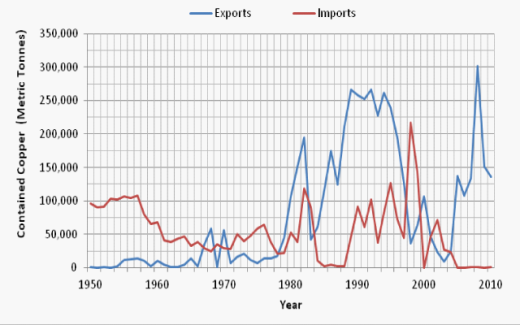 The opponents of the Rosemont Copper project have a catchy sound bite they use at every public meeting. It goes like this: “The profits go to Canada, the copper goes to China, and all we get is a hole in the ground.” However, this prejudicial statement offers very little real justification for denying Rosemont Copper an opportunity to develop its proposed 21st century mining project and appears to have only been injected into this debate to inflame anti-foreign sentiments of the citizens of Arizona. Let’s examine this statement in detail.
The opponents of the Rosemont Copper project have a catchy sound bite they use at every public meeting. It goes like this: “The profits go to Canada, the copper goes to China, and all we get is a hole in the ground.” However, this prejudicial statement offers very little real justification for denying Rosemont Copper an opportunity to develop its proposed 21st century mining project and appears to have only been injected into this debate to inflame anti-foreign sentiments of the citizens of Arizona. Let’s examine this statement in detail.
Opponents argue the Rosemont Copper project should not be approved because its profits will go to Canada. Let me see if I got this straight. Investors have already spent nearly $300 million to get this project to this point and will invest a total of $1.2 billion dollars to place this 21st century mining project in production. Now opponents of this project claim it should not be approved because Augusta Resource’s investors will earn a profit on their investment. Why shouldn’t they earn a profit on their investment? Have other foreign-based companies been denied an opportunity to do business in America because they will profit from their investments?
Adversaries argue this project should not be permitted to be developed because America will not benefit from its copper, much of which will be shipped to Asian smelters for reasons that are beyond control of Rosemont Copper. Other U. S. copper producers ship copper concentrates to foreign smelters (see Figure 1). Why shouldn’t Rosemont Copper? Do we have a free market economy or don’t we?
Their claim that the only thing America gets is a hole in the ground is also highly misleading. Yes, there will be a hole in the ground when this project is done, but the citizens of Tucson, the state of Arizona and this nation will receive many benefits over the life of this project. Even after this project is completed, an Arizona State University study finds that regional economic activity will remain $52 million per year higher than if the Rosemont Copper project never existed at all.
Profits represent a small fraction of the total cash flow that will be generated by this mining operation. Who will benefit from the cash flow generated by the Rosemont Copper project? Much of the cash flow will be spent here in America to pay the costs of developing and operating this 21st century mining project.
Over its two year development phase, the Rosemont Copper project will create 1,500 badly needed jobs for construction workers, who are still suffering from the effects of the Great Recession of 2008. During the life of this project, its cash flow will benefit southeastern Arizona through the creation of approximately 400 direct jobs at the mine site. An additional 1,700 indirect jobs will be created by companies, who provide goods and services to this operation. This economic activity will result in an average of $140 million per year of additional income to the residents of southeastern Arizona. It will also generate $19 million in revenues per year to local governments, which will help pay for the education of our children and badly needed repairs to our roads.
This project will still benefit America because it will create an American-made product produced by Arizonans, which will offset copper imports, reducing America’s overall net import reliance on foreign sources for copper. This will ultimately lower our nation’s unsustainable trade deficits and reduce our dependence on foreign imports, which currently threaten our economic and national security.
Finally, southeastern Arizona will benefit from Rosemont Copper, who has shown itself to be a responsible member of this community. They have clearly demonstrated their commitment to meet the challenges southeastern Arizona faces by working with citizens of our community to find practical solutions for common problems. This commitment has been re-enforced by substantial investments they have made in new technologies and innovative mining and reclamation practices, which will significantly minimize Rosemont’s environmental and social impacts on the surrounding area.
 David F. Briggs is a resident of Pima county and a geologist, who has intermittently worked on the Rosemont Copper project since 2006. He can be contacted at miningandyou@aol.com.
David F. Briggs is a resident of Pima county and a geologist, who has intermittently worked on the Rosemont Copper project since 2006. He can be contacted at miningandyou@aol.com.
Copyrighted (2013) by David F. Briggs. Reprint is permitted provided the credit of authorship is provided and linked back to the source.

